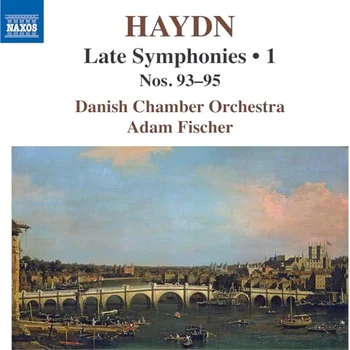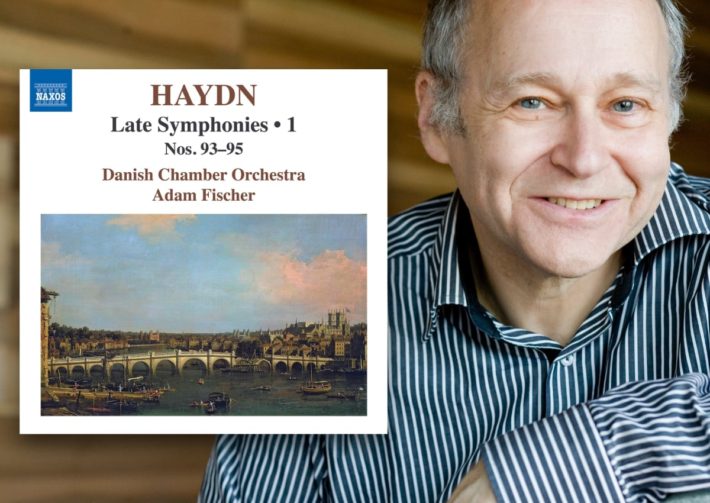Image: ©️ Szilvia Csibi
Ádám Fischer is no stranger to the Haydn symphonies, having recorded a complete cycle with Austro-Hungarian Haydn Orchestra on Nimbus three decades ago. Excepting a DVD recording of Haydn’s Creation, Fischer has not released any Haydn since then, but now, perhaps at the behest of Naxos, he and the Danish Chamber Orchestra embark on a series to include the last 25 symphonies (which would therefore include both the Paris and London sets).

The Nimbus recordings, made in the Haydnsaal, Esterházy Palace, Austria, were some of the first productions, and the engineers had not yet mastered the overly reverberant room, making the music’s many contrapuntal passages cloudy. Fisher had not yet fully settled on his interpretative approach, and the sluggish orchestral playing lacks subtly. No such issues are present in this new recording: a warm yet intimate soundstage ensures transparent orchestral textures. And anyone who has heard the Fischer/DCO Mozart, Beethoven and Brahms cycles will know what to expect: razor sharp articulation, minimal vibrato, and a wide range of bow strokes (which Fisher discusses in the liner notes). To enhance textural clarity Fischer sometimes asks for non-legato phrasing, which might disappoint those of us who love the classic Royal Concertgebouw Orchestra/Colin Davis recordings. The Danes use natural trumpets (and horns?), and timpani are struck with wooden mallets. The woodwinds are brimming with character.
Fisher is, of course, trying to recreate the sound world Haydn knew. But he also explains in his note that the atmosphere of Haydn’s concerts was like “rock concerts today” and that if a modern performance fails to conjure a similar mood, it fails to be authentic. Arguing that Haydn’s popularity trails Mozart and Beethoven, Fisher intends his performances to be “powerful, stormy, and exciting” to ensure we experience what those first audiences felt and heard.
Speed is one way this is accomplished. Each symphony is played significantly faster than his previous recordings (the ‘Surprise’ movement in No. 94 comes in at 5’14”, over a minute faster than his first performance, and in fact the fastest reading I know). The Minuet third movements would require dancers in fairly good shape to keep apace. And, on a purely technical level, the exacting articulation and panache of the final movements is a brilliant and virtuosic display.
Fischer does allow himself to relax in the slow movements of symphonies 93 and 95, summoning a delightful lucidity from the orchestra through a variety of bow strokes. Yet some listeners may hear this as inauthentic micro-managing, an understandable and valid argument. And there are several places where Fischer’s drive to be ‘exciting’ leads him to take liberties with Haydn’s score. For instance, in the slow movement of Symphony no. 93, Fischer and his players do a fabulous job of instilling a mood of quiet fragility, which Haydn then rudely interrupts with a bassoon fortissimo ‘fart.’ But Fischer instructs the bassoons to start soft and crescendo, making what is obviously intended as a crude joke too polite – does Fischer draw the line at flatulence?
More problematic, perhaps, is the use of col legno (playing with the wood of the bow) in the recapitulation of the first movement of No. 93 (track 1, 6’00”) and in the slow movement of No. 94 (track 6, 2’45”). In neither place does Haydn ask for this. It did make me smile, and the first time I heard it perhaps I even found it effective, but these changes suggest Fischer feels Haydn needs help to be funny and charming, and that is simply not the case.
To sum up, there are highly energized, fully characterized performances with some challenging interpretative choices that I enjoyed hearing, even if some of Fischer’s interpretative decisions prove disappointing.
Recommended Comparisons
Davis | Fischer | Hogwood | Szell
Haydn: Late Symphonies, Vol. 1 – Ádám Fischer
Danish Chamber Orchestra
Ádám Fischer – Conductor
Naxos, CD 8574516



















